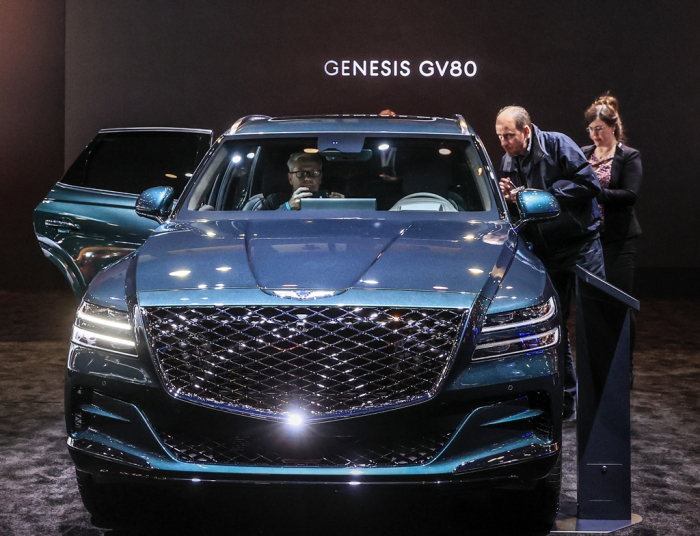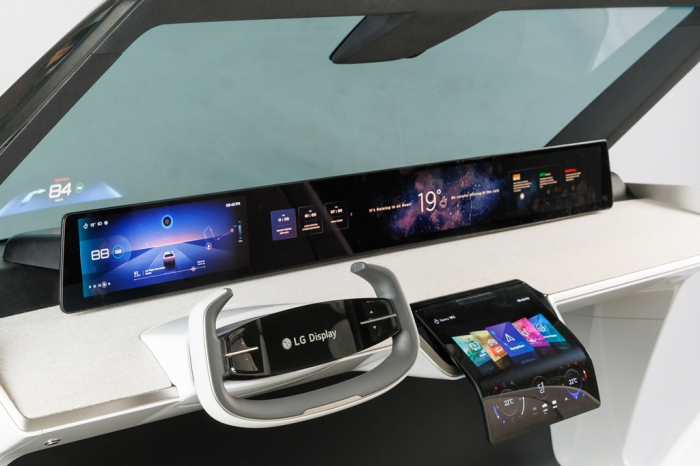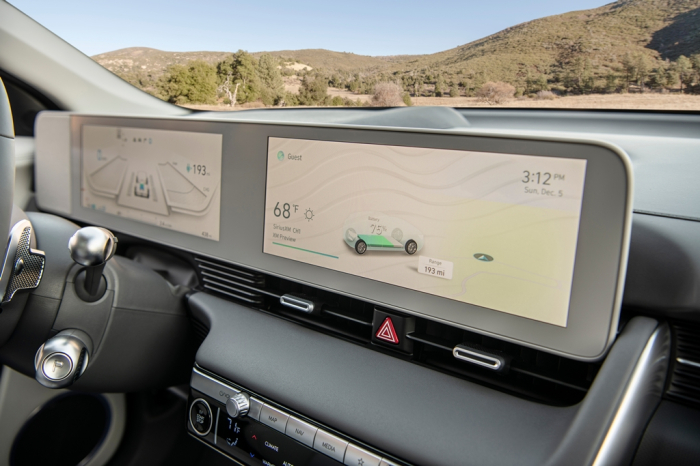Genesis GV80 to come with LG’s OLED auto display in close tie-up
Hyundai is strengthening its tech alliance with LG, Samsung and SK to lead the pack in the future mobility sector
By Jul 03, 2023 (Gmt+09:00)
LG Chem to sell water filter business to Glenwood PE for $692 million


Kyobo Life poised to buy Japan’s SBI Group-owned savings bank


KT&G eyes overseas M&A after rejecting activist fund's offer


StockX in merger talks with Naver’s online reseller Kream


Mirae Asset to be named Korea Post’s core real estate fund operator



Hyundai Motor Co.'s premium brand Genesis will be equipped with LG Display Co.'s organic light-emitting diode (OLED) automotive display for its new GV80 model’s integrated dashboard-infotainment system.
The 2024 GV80 facelift model, to be released later this year, will come with LG’s 27-inch OLED screen for the luxury SUV’s panoramic display, which combines screens for the dashboard, navigation and the SUV's infotainment system, industry sources said on Monday.
Genesis cars have so far had separate liquid crystal displays (LCDs) for the instrument panel and the infotainment screen.
However, starting with the remodeled 2024 GV80, all Genesis vehicles will use the integrated panoramic OLED display, sources said.
If all goes to plan, the GV80 will be the first car equipped with an OLED auto display among the vehicles built by Hyundai Motor Group, which includes Hyundai Motor, Kia Corp. and auto parts maker Hyundai Mobis Co.

Thanks to OLED’s self-luminous properties, the OLED display is highly sustainable and saves energy. OLED is also thinner and lighter than LCD.
Luxury brands such as Mercedes-Benz, BMW and Audi have already applied OLED displays to their high-end models as the screens boast excellent picture quality, wider viewing angles and faster response time.
LG, one of the industry’s leading OLED makers, began selling its OLED panels for digital cockpits to Mercedes-Benz in 2021 and is widening its client base.
STRENGTHENED TECH ALLIANCE
Hyundai, the country’s top automaker, is strengthening its tech alliance with domestic partners such as Samsung, LG and SK to stay ahead of its global peers in the future mobility arena, including electric vehicles and self-driving cars.
Earlier this month, Samsung Electronics Co. said it will supply its Dolphin chipset, one of its latest automotive chips, to Hyundai to support the carmaker’s advanced driver assist system (ADAS) in the GV90 sedan.

Samsung, which is already supplying various types of vehicle semiconductors, including image sensors, plans to sell the Exynos Auto V920 auto chip used in in-vehicle infotainment (IVI) systems, to Hyundai from 2025.
Analysts said Hyundai is strengthening its tech alliance with Korean conglomerates because these companies are already global leaders in their respective business areas.
The IONIQ 5, Hyundai’s EV crossover, sits on battery cells manufactured by SK On Co., a unit of SK Innovation Co. The electric car’s side-view cameras use OLED panels supplied by Samsung Display Co.
LG’S NEW CASH COW
LG Group has been pushing for the auto component business as one of its future growth drivers, led by affiliates such as camera module maker LG Innotek Co., EV parts maker LG Magna e-Powertrain Co. and LG Electronics Inc.

LG Electronics said on Friday that it expects its automotive electronics business to post 100 trillion won ($76 billion) in order backlogs by the end of this year on growing demand from automakers for advanced IVI systems.
The enhanced tie-ups among Korea’s big four conglomerates will promote close communications, cut logistics costs and strengthen the supply chain with smaller local parts suppliers, analysts said.
According to market research firm Omdia, this year’s estimated automotive OLED display panel shipments have been revised up to 1.14 million units from 890,000 units earlier, and are forecast to grow further to 5 million units by 2026.
Write to Ik-Hwan Kim and Nan-Sae Bin at lovepen@hankyung.com
In-Soo Nam edited this article.
-

-
 AutomobilesHyundai ramps up ties with Samsung, SK, LG for EVs, self-driving cars
AutomobilesHyundai ramps up ties with Samsung, SK, LG for EVs, self-driving carsJun 11, 2023 (Gmt+09:00)
3 Min read -
 Korean chipmakersSamsung to supply new Exynos auto chip to Hyundai in close tie-up
Korean chipmakersSamsung to supply new Exynos auto chip to Hyundai in close tie-upJun 07, 2023 (Gmt+09:00)
3 Min read -
 ElectronicsLG Display to focus on automotive screens for turnaround
ElectronicsLG Display to focus on automotive screens for turnaroundMar 31, 2023 (Gmt+09:00)
1 Min read -
 ElectronicsLG Display to showcase high-performance OLED panels for gaming at CES
ElectronicsLG Display to showcase high-performance OLED panels for gaming at CESDec 30, 2022 (Gmt+09:00)
1 Min read -
 ElectronicsLG Display unveils world’s first high-resolution stretchable display
ElectronicsLG Display unveils world’s first high-resolution stretchable displayNov 08, 2022 (Gmt+09:00)
2 Min read -
 ElectronicsLG Display set to benefit from post-pandemic automotive display boom
ElectronicsLG Display set to benefit from post-pandemic automotive display boomAug 19, 2022 (Gmt+09:00)
2 Min read


